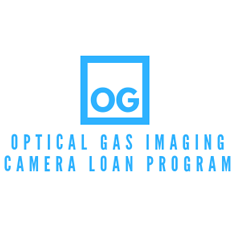Optical Gas Imaging Camera Loan Program
The Optical Gas Imaging Camera Loan Program ended in December 2023.
The Problem
Gas leaks from oil and gas exploration and production facilities are primarily volatile organic compounds (VOCs), which react with nitrogen oxides (NOx) in the presence of sunlight and heat to form ozone. About 44 percent of the known VOC inventory in the Denver Front Range is estimated to be from the oil and gas industry. Although leaks are included in the estimated inventory, ground level monitoring and photochemical modeling suggest that the inventory does not adequately reflect the actual VOC emissions from oil and gas operations.
Currently, the region exceeds both the 2008 and 2015 federal ozone standard (75 parts per billion (ppb) and 70 ppb respectively). Using an Optical Gas Imaging (OGI) Camera to locate and repair VOC leaks can help reduce precursor emissions that contribute to ozone formation, which assist the region in attaining the standard.
Optical emission detection is a relatively new technology that has been developed to provide rapid, accurate and safe identification of fugitive emissions. This technology enables technicians to “see” emissions of hydrocarbon vapors that are normally not visible to the naked eye. The camera provides visible images of gas emission leaks in real time, which enables precise identification of the origin. This is essential for repair activities and assessing the magnitude of leaks based on plume size and density.
The Program
In 2011, the Regional Air Quality Council (RAQC) received a Supplemental Environmental Project (SEP) grant from the Colorado Department of Public Health and Environment (CDPHE) to acquire an OGI Camera for the purpose of loaning out to Qualified Users (i.e., industry representatives, local government, health department and university staff) to identify and repair gas leaks primarily at oil and gas industry exploration and production facilities across Colorado. In addition, the RAQC provides periodic training to potential Qualified Users to become level 1 certified, which enables individuals to borrow the camera for such activities. The availability of this camera has been instrumental in the identification of hundreds of leaks in the Denver Metro/North Front Range nonattainment area and the RAQC plans to continue this program for the foreseeable future.


